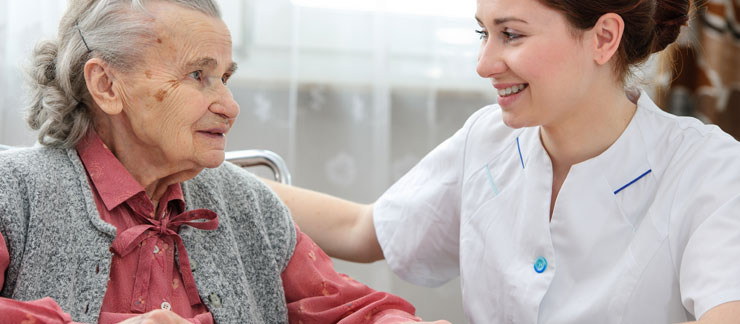
How Home Care Changes Between Alzheimer’s and Dementia
The terms “dementia” and “Alzheimer’s disease” are often used interchangeably, but they’re not the same. Dementia is a broad term that describes mental decline serious enough to interfere with daily activities. Alzheimer’s disease is the most common type of dementia, covering about 60-80% of all dementia.
When someone you love is experiencing cognitive decline, it’s important to understand the differences so you know how to help. Being the family caregiver for someone living with dementia can be difficult, and learning more about what they’re facing can help you respond with the right type of support.
Dementia: An Umbrella Term for Mental Decline
Dementia happens when nerve cells in the brain stop working and lose their ability to communicate among themselves. A person with dementia may lose their ability to think, remember, and reason. About 33% of people over age 85 have a form of dementia. While dementia is more common in older people, it is not a normal part of aging.
Besides Alzheimer’s disease, other types of dementia include frontotemporal dementia, Lewy body dementia, and vascular dementia. Sometimes, a person has more than one type, which is called mixed dementia.
People with early stages of dementia may start to show signs such as:
- Confusion, memory loss, and poor judgment
- Difficulty with speaking, expressing thoughts, and writing or reading
- Getting lost in a familiar neighborhood
- Hallucinations or paranoia
- Impulsive actions
- Lack of interest in regular events and activities
- Movement and balance problems
- Repeating questions
- Trouble doing household tasks or paying bills
- Using unfamiliar words for common objects
Related reading: If You Suspect Dementia: The Full Diagnostic Process
Alzheimer’s Disease: A Type and Cause of Dementia
Alzheimer’s disease is the most common type of dementia. About six million people in the U.S. have Alzheimer’s disease, which causes clumps called amyloid plaques and bundles (neurofibrillary tangles) to form in the brain. Nerve cells lose their connection and, over time, their ability to transmit messages in the brain.
At first, damage occurs in the parts of the brain responsible for memory. Later, areas involved in language, reasoning, social behavior, and beyond are affected. Researchers think Alzheimer’s disease is likely caused by several factors, such as genetics, lifestyle, and environment.
Early signs of Alzheimer’s disease can be similar to other forms of dementia and may include:
- Challenges finishing familiar tasks
- Confusion about time or place
- Difficulty planning or problem-solving
- Difficulty with decision-making and judgment
- Memory loss, especially with new information
- Losing things
- Mood and personality changes
- Trouble following a conversation or finding words
- Misnaming things
- Vision changes that can lead to difficulties in balancing or reading
- Withdrawal from social and work activities
Related reading: 3 Myths About Alzheimer’s and Dementia Home Care for the Elderly
Tips for Caring for Someone with Early Signs of Dementia
Caring for someone with Alzheimer’s or dementia can be difficult, especially when they are challenged to communicate.
Use body language clues to know when someone might be cold (shivering) or hungry (rubbing their stomach). Yelling and cursing may be the only way your loved one can express themselves in the moment—try not to take this personally.
When it comes to daily activities, keep these tips in mind to make things easier for everyone:
- Allow your loved one to be as independent as possible while staying safe.
- Keep a routine. Bathe, dress, and eat meals at the same time each day.
- Keep well-loved objects and photos around the house.
- Make sure clothing is loose-fitting and easy to change.
- Plan activities that meet their interests and abilities.
- Remind your loved one who you are, but avoid asking “don’t you remember?”
- Respect their personal space.
- Speak calmly and listen to their concerns or frustrations.
- Take a walk together each day.
- Write down appointments and to-do lists.
Home Care Can Help You
Helping your senior loved one manage the challenges of dementia can be stressful. It’s not easy to watch someone you love experience cognitive decline.
Carve out time to take care of yourself, too. Caregiver stress is real, and it can have serious impacts on your health. Respite care from Visiting Angels can help. Our caregivers offer flexible in-home help so you can take a few hours or a few days to care for yourself, knowing that your loved one is receiving quality, dedicated care and companionship.
Contact your local home care office to learn how Visiting Angels can support your senior. Schedule a free home care consultation today.


